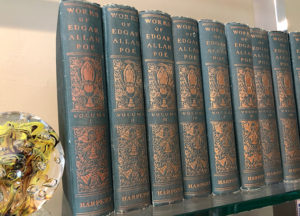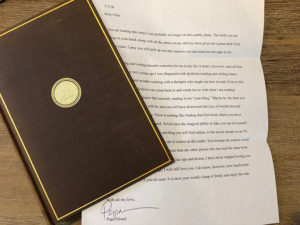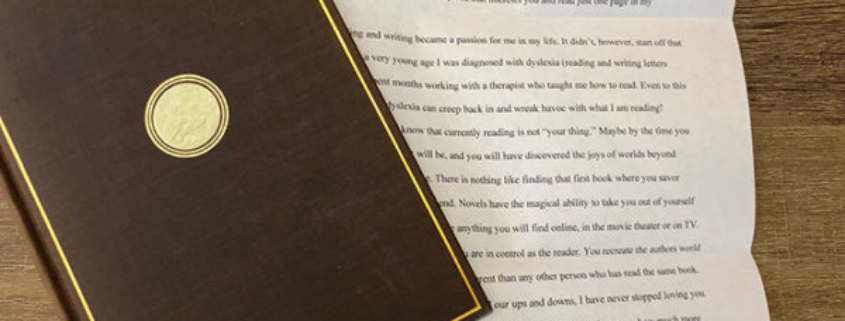Feeling Like a Fraud
Is it embarrassing that my nineteen-year-old child has never read a book?
I was once asked if maybe he didn’t read, because he couldn’t. A lot of well-meaning, natural born, corn raised, American people tend to generalize when the child in question is adopted from a foreign (pronounced: /FUR-ən/) country.
“That poor child, I’m sure he must suffer from some rare condition that we haven’t even heard of in the United States. Have you had him diagnosed?”
Diagnosed?
“Yes, you know, by a doctor.”
I was looked at as if I didn’t know that was an option. Or, what a doctor was.
“Well, he is off the charts with ADHD, but other than that he’s smart as a whip.”
“Oh, yes, I’m sure he is. But really, have you had him diagnosed?”
 Many of today’s young adults wouldn’t know what a real book looked like even if it mysteriously appeared midair like an apparition. Maybe if it were in the form of something expensive or trendy, like an iPhone, a Benjamin, or a bong they might take notice, but even then, once it became evident that they would have to do something intellectually with it, like read, all bets would be off the table.
Many of today’s young adults wouldn’t know what a real book looked like even if it mysteriously appeared midair like an apparition. Maybe if it were in the form of something expensive or trendy, like an iPhone, a Benjamin, or a bong they might take notice, but even then, once it became evident that they would have to do something intellectually with it, like read, all bets would be off the table.
“WTF do you want me to do with that thing?”
It’s not as if one is handing them the dirty laundry basket, or even a small, sickly kitten that requires round the clock care. It’s merely something you hope, as a parent, would give them joy as it did for you as a child. Or, at the minimum, help them move out of their dark, dirty bedroom and into the bright lights of the family room to enjoy a chapter or two of a novel, any novel.
The problem in today’s digital environment of instant gratification is that reading for edification or enjoyment for many young adults is neither. They spend every waking hour sitting in front of their computer screen, tablet or phone. To them, that is reading. A book doesn’t vibrate or play sounds like a video game does. There is no option to get rich by reading as there is by, let’s say, creating videos of you and your girlfriend blowing kisses at the dog and posting them on YouTube. No sponsor is waiting in the wings if they (god forbid) post a video discussion about the theme of the book, or its plot points and inciting incident. Merely sitting, reading and enjoying is not enough. Maybe if we could develop a way for plotlines to vibrate and make sounds at just the right spots we would be able to hook them. Or, at a minimum, if just opening a book could make them lots and lots of money, everything I have written above would morph into one gigantic moot point. Please? Anyone?
* * *
Earlier this week I had the opportunity to buy two multi-volume sets of books being sold by the UCSD library system. The first is a twenty-five-volume set of The Works of Rudyard Kipling, and  the second is a ten-volume set of The Works of Edgar Allan Poe. When I got them home and placed them on a shelf in my humble little library, I began to wonder about how many other shelves these volumes have sat on over the years. The Kipling set is 92 years old, and the Poe set is somewhere between 116 to 169 years old! If memory serves me correctly, there were no electronics to divert your attention in those years, nor a better option for entertainment on a daily basis than picking up a book and reading it. While there were still no sponsors waiting in the wings, there was pure joy about starting a new book or reading another chapter. You could almost feel the book vibrate in your hands from the excitement of turning a page or meeting a character for the first time.
the second is a ten-volume set of The Works of Edgar Allan Poe. When I got them home and placed them on a shelf in my humble little library, I began to wonder about how many other shelves these volumes have sat on over the years. The Kipling set is 92 years old, and the Poe set is somewhere between 116 to 169 years old! If memory serves me correctly, there were no electronics to divert your attention in those years, nor a better option for entertainment on a daily basis than picking up a book and reading it. While there were still no sponsors waiting in the wings, there was pure joy about starting a new book or reading another chapter. You could almost feel the book vibrate in your hands from the excitement of turning a page or meeting a character for the first time.
As I stare at my new books on the shelf, I can’t help by wonder how many hands have opened each one over the years and read them. Were books in the late 19th and early 20th century as popular as Fortnite is for a lot of kids today? Did parents in those years worry that too much reading was distracting their kids from getting ahead?

Illustration from 19th century
“Dearest, have you spoken to young Joshua about how much time he spends reading? He won’t even pick up a violin. How can he expect to get ahead in life if he can’t play a proper concerto?”
“Shall we have the doctor diagnose him?”
“Diagnose him? Oh dear, I shudder at that thought. What if we find out he is tone deaf? He will be lost to those damnable books forever!”
* * *
Tonight, my son is over at a friend’s house creating “beats” for local rap artists. He hopes to make it big in the music industry someday. I am pondering going out tonight and purchasing a book on the history of rap, but I fear the only person reading it will be—me. I don’t want to discourage him, but I am beginning to feel like a fraud. Can a person with an MFA in creative writing have a child, who by choice, refuses to read? Shouldn’t I be able to magically instill in him the joy of reading now that I am about to be empowered with my degree? What does it say about me as an educator, or even a thought-provoking writer, that nothing I can say or write impresses him enough to pick up a book?
There was a time when I did believe my son was going to be a writer. In fact, I still think he should explore that aspect of his creative side. I always found magic and beauty in the few words he put down on paper. His high school teachers, however, were harsh and chastised him for not writing more on any particular topic. In his mind, he succinctly captured the heart of the subject. Why write three-hundred pages when no one he hung out with would read them? Did his teachers do him a disservice by not finding the golden nugget in his writing and working with him to edit versus extend? We need to find a way in our educational system for words to vibrate with our youth. For the sound of well-written sentences, when spoken, to make them hunger for more. To encourage them to write poetry, if the tedium of writing essays is turning them away from the written word.
I don’t know if he’ll outgrow this phase, or if reading will eventually bring him enjoyment. I don’t know if, even with a master’s in hand, I will ever be able to inspire him. I do hope, however, that one day—even if he is just packing them away after I have passed—he will crack open Volume I of The Works of Rudyard Kipling. If he doesn’t read the book, hopefully, he’ll find the letter I  wrote to him tonight telling him about how much joy reading books have brought to me and his other dad’s lives.
wrote to him tonight telling him about how much joy reading books have brought to me and his other dad’s lives.
Asking him to read just one page.
Telling him how much I love him even if he doesn’t read, but how much more he will love himself if he does.
 Jerry Parent is an MFA candidate in creative writing at Antioch University Los Angeles. He is serving as Lunch Ticket’s Lead Blog Editor. He earned his B.A. in philosophy from St. John’s Seminary College, and currently resides in San Diego with his husband, son, two dogs and one cat. He and his husband own one of San Diego’s oldest floral companies, Adelaide’s, located in the village of La Jolla.
Jerry Parent is an MFA candidate in creative writing at Antioch University Los Angeles. He is serving as Lunch Ticket’s Lead Blog Editor. He earned his B.A. in philosophy from St. John’s Seminary College, and currently resides in San Diego with his husband, son, two dogs and one cat. He and his husband own one of San Diego’s oldest floral companies, Adelaide’s, located in the village of La Jolla.





